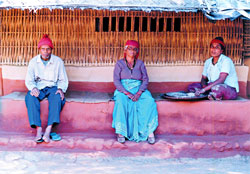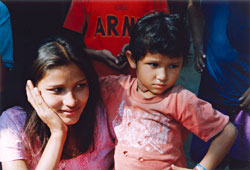 It almost looks like a movie set-perfectly lined, well-thatched mud and bamboo houses, wide paths everywhere, solar parabola cookers reflecting the winter sunlight and faces peeping out from every nook and cranny.
It almost looks like a movie set-perfectly lined, well-thatched mud and bamboo houses, wide paths everywhere, solar parabola cookers reflecting the winter sunlight and faces peeping out from every nook and cranny.
Beldangi-I appears as normal as any other village on the plains of Nepal, its only distinct feature being an almost obsessive cleanliness. But this is one of seven refugee camps in Nepal that has housed Lhotshampa refugees from Bhutan for the past 15 years. While their numbers have grown and living conditions deteriorated over the years, their plea hasn't changed-"let us go back to our houses, our lands and our dignity".
The seven camps house around 100,000 refugees, who were evicted by the government of Bhutan's King Jigme Singye Wangchuk. Fearing demographic inundation of his Ngalong-dominated state by ethnic Nepalis who had been arriving for decades in search of land, the Druk government created a mass fear psychosis to ensure that the farmer families left Bhutani land.
It alleged that anti-national terrorists were wrecking havoc in the country's south and began to carry out wide-scale evictions, closing southern schools, confiscating citizenship cards and burning and demolishing homes. Says Khadua Bahadur Ringalung (Rai), formerly the Dagadzon District President, "they refused to let our wives and daughters wear sindur and pote and said they wouldn't even let us burn our dead, in order to chase us out of the country".
Many of those kicked out were also made to sign voluntary migration forms at gunpoint as they left Bhutan. When these migrants entered India, they were steered through the Duars region to Nepal. Sanumaya Karki Chettri, mother of three, remembers her flight. "As we ran from our houses we thought that we would definitely be killed. We had nothing and we thought that life was over but then we came here and soon we found the camps."
The hopelessness of the newly-arrived refugees has turned into despair within the Bhutani camps recently as news from the UN High Commission for Refugees (UNHCR), which partly funds and administers the camps, circulates among residents-schools are to be cut back to class five and briquettes will replace kerosene for fuel.
These are only the latest in a litany of developments that have made life harder for the refugees, most of who were once innocent farmers content with their simple lives. Such day-to-day struggles and the failure of the Nepali and Bhutani governments to agree on a solution have turned many of them 'political'. They are now aware of the rights and freedoms they hold within the little space they now occupy and those that they could claim if they had a country they could call their own.  Growing awareness has also lead to politicisation along party lines, which some say has distracted refugee leaders away from pressing problems such as human rights and an early return. The rise of political parties has in fact impeded the way to a solution as instead of working together the parties compete against each other, they add.
Growing awareness has also lead to politicisation along party lines, which some say has distracted refugee leaders away from pressing problems such as human rights and an early return. The rise of political parties has in fact impeded the way to a solution as instead of working together the parties compete against each other, they add.
As frustrations rise and morale dips, there are disturbing signs such as increasing indiscipline, rise in alcohol abuse and domestic violence. The walls of a nursery school are lined with posters decrying domestic violence and rape. Asked if the condition was so bad that children had to be made aware from such a young age, a passing local smiles and explains, "that is not for the children, it is to create awareness among the parents who come to drop their children off".
Increasingly, husbands here are taking second wives, abandoning the first. This happened to both Nirma and her mother Krishna Maya. "It has been five years since he left me and my newborn child Kamala. I hear he is now living in another camp with a younger woman but we haven't heard from him since," says Nirma echoing her mother, Krishna Maya's story. Krishna Maya's husband left her the year they arrived from Bhutan because she did not have a son.
Officially the refugees cannot work outside the camps but every morning at around seven, a stream of cycles leaves the camps. One aid worker revealed that the Nepali government is 'relatively lenient' about employment so the refugees work but for shamefully low wages due to their illegal status and oversupply.
The frustration is more apparent among the well-educated youth as their ambitions rise beyond the camps. Says Karan Gurung, a class 12 English student of Sanischare Camp in Moran, "I already teach grades one and two in the camp here. Later I want to teach at a private boarding school. I know finding a job will be difficult-there are many who complete their degrees and move out only to be forced to come back because they can't find jobs. Those are probably the most frustrated people here".
Although the camps lack barbed wires, fences or gates to block their passage to the outside world, an invisible wall surrounds the refugees. The outside world is a sinister place for a person without citizenship and no papers to prove who they are. As Hari Maya, 60, says, "I am an old woman now, I want to go back to my own country, back to my farm and die there. That is my only wish-to be able to die in my own backyard".
Picture Caption: (top) Bhutani refugees sitting on the porch outside their mud hut. (above) Nirma with her daughter Kamala


